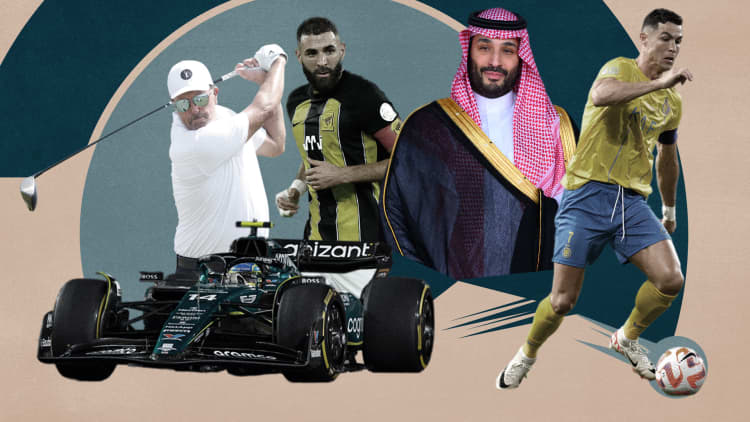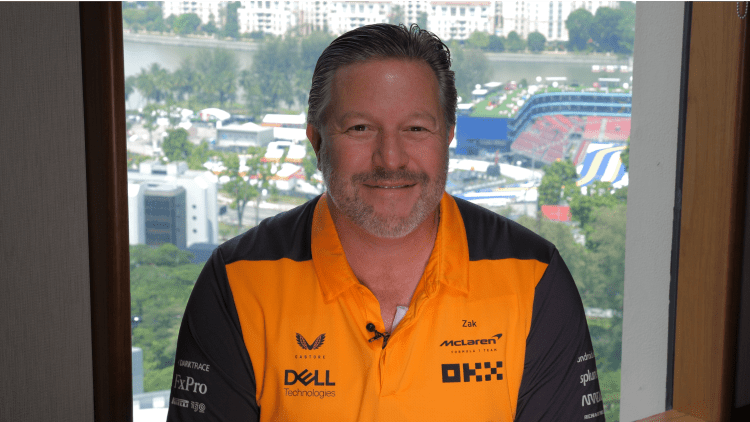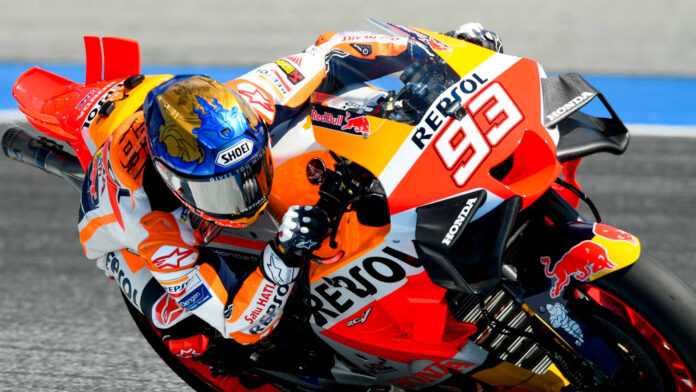BURIRAM, THAILAND – OCTOBER 28: No.93 Marc Marquez of Spain and Repsol Honda Team during qualifying at Chang International Circuit on October 28, 2023 in Buriram, Thailand. (Photo by Supakit Wisetanuphong/MB Media/Getty Images)
Supakit Wisetanuphong/mb Media | Getty Images Sport | Getty Images
MotoGP legend Marc Márquez says leaving Repsol Honda — where he has won six premier class world titles over the last decade — was the biggest and most difficult decision of his career.
Márquez will leave his current team at the end of this season of Grand Prix motorcycle racing (MotoGP). He joined Honda in 2012, before becoming the youngest ever MotoGP world champion in his rookie year in 2013, at the age of 20. He defended that title in 2014 and went on to win four more accolades in 2016, 2017, 2018 and 2019.
Since then, a series of serious injuries and a drop-off in performance of the Honda bike relative to rival manufacturers, particularly the currently dominant Ducati, have prevented him from tilting at a record-equalling seventh premier class world championship.
With two race weekends left of this season and the Honda continuing to struggle, Márquez sits 14th in the riders’ championship standings, while his teammate and 2020 world champion Joan Mir is down in 22nd position.
The 30-year-old Spaniard, widely considered one of the most gifted motorcycle racers of all-time, will join Gresini Ducati next season, where he will switch to the bike currently ridden by the top three riders in this season’s championship.
“It was the most difficult decision and biggest decision of my career, especially because you are leaving from your comfort zone, from your team, from your family, from the team that gave to you many things and where the relationship is super good,” Márquez told CNBC via videolink from Malaysia, where he was preparing for the Malaysian motorcycle Grand Prix.
PHILLIP ISLAND, AUSTRALIA – OCTOBER 18: Marc Marquez of Spain and Repsol Honda Team speaks with journalists during the pre-event at San Remo Foreshore Park during the 2023 Australian Motorcycle Grand Prix at Phillip Island Grand Prix Circuit on October 18, 2023 in Phillip Island, Australia. (Photo by Mirco Lazzari gp/Getty Images)
Mirco Lazzari Gp | Getty Images Sport | Getty Images
While he believes household name Honda will eventually return to the top even in his absence, Márquez said he did not have time to wait for the brand to raise the bike’s performance, if he wants to capitalize on the remaining years of his physical prime. He vowed to give his all in the final three races of this season to thank Honda for what the team has given him over the past decade.
At Gresini Ducati, a satellite team of the flagship Ducati Lenovo factory team, Márquez will be riding what is currently the most dominant bike on the grid. He is well aware of the weight of expectations.
“First, second and third in the championship are riding that bike so this means no excuse for the bike — it is everything about you, but I need my time,” he said, noting the difficulty of adapting to a new bike after 11 years on the Honda.
“Of course, if I work, then we’ll have a chance in the future, but my work right now is to go out from that expectation and just focus on myself.”
‘Respect your body’
Although he enjoyed a glittering career up until 2020, Márquez has suffered several terrifying crashes and serious injuries down the years, resulting in a number of surgeries and spells on the sidelines.
“Maybe the biggest lesson or the most important one was: respect your body. Because in the end, as you know, all athletes try to push your body in the limits when you are injured, try to be faster in your recovery, try to come back as soon as possible,” Márquez said, emphasizing the importance of respecting recovery timelines.
“Because your body is one. If you take care about your body, you will have more races or more years, but if you don’t take care about your body, about your physical condition, then your career will be shorter.”
Some have attributed the spectacular nature of Márquez’s crashes to the distinctive riding style — involving uniquely aggressive cornering and braking techniques — that propelled him to the pinnacle of the sport. The style has captivated fans, but forced the rider to endure some difficult spells, both physically and mentally.

“In the hard moments is where you learn more, but I don’t wish to anybody to cross those kinds of moments. It’s super difficult to keep motivated in that moment, but the most important is keep your routines, and that is a real job — keep the routines, thinking that everything will be better in the future,” he said.
Although he has adjusted his riding style down the years, Márquez said he “cannot ride a bike in another way” besides right at the very edge of its capabilities.
“Sometimes I tried to ride a bike in an easy way, easy going, and I’m doing many mistakes then because my concentration is not the same, and when I’m really pushing, it’s there when I’m really focused,” he said.
“This is coming from natural instinct. Sometimes I’m training at home and even training at home with nobody watching me, I cannot ride easy mode, so I need to push and find always that limit.”




